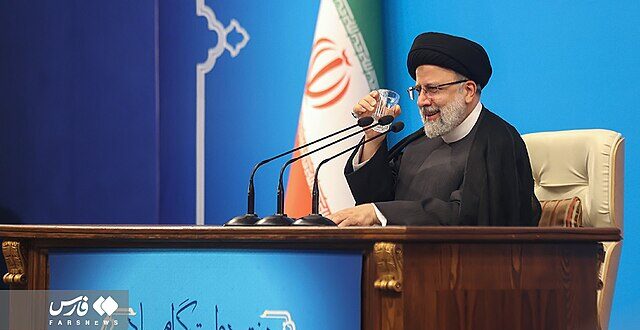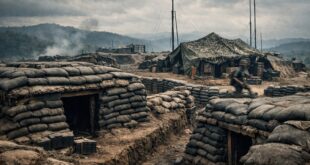Raisi was aboard a helicopter that crashed in Iran’s mountainous northwest on its way back from the border with Azerbaijan.
The ruling mullahs in Tehran have demanded that people in Iran stop behaving gleefully over the death of President Ebrahim Raisi.
Raisi and other senior officials when their helicopter crashed in bad weather in East Azerbaijan province on Sunday. There were flying from a visit to the border with Azerbaijan.
Raisi was reviled by opponents of Iran’s authoritarian Islamist government for his role as a prosecutor who ordered mass killings of political prisoners in 1988 and for using his presidential powers to violently suppress a women’s rights protest movement that erupted nationwide in late 2022 and continued into 2023.
Dadban, an Iran-based group of lawyers defending political prisoners and rights activists, wrote on the X platform that it received messages from people who said they were ordered to remove online content expressing joy at Raisi’s death.
“The judicial and law enforcement authorities in Iran have threatened citizens since yesterday that they will be dealt with if they publish “provocative” content on cyberspace about the death of Ebrahim Raisi,” the group wrote, according to an online translation.
The Islamic Republic’s Iranian critics inside and outside Iran have flooded social media with mockery of Raisi since his death, with some posting the Persian hashtag “helicotlet,” a combination of the words helicopter and cutlet. Many of those critics celebrated the 2020 killing of top Iranian commander Qassem Soleimani in a U.S. missile strike in Baghdad by referring to him as a “cutlet.”
Persian social media users also posted videos appearing to show people in different parts of Iran sharing sweets and chocolates on Monday to celebrate Raisi’s death.
Iranian President Ebrahim Raisi, Foreign Minister Hossein Amirabdollahian, and other officials were found dead Monday at the site of a helicopter crash in northwestern Iran, state media said.
Search crews found the wreckage Monday, a day after the helicopter crashed in bad weather near Varzaqan in Iran’s East Azerbaijan province. The Iranian officials were returning to Iran after attending a dam project inauguration at the Iran-Azerbaijan border.
Images posted to social media and deemed credible by VOA Persian showed opponents of Iran’s authoritarian Islamist rulers setting off fireworks in multiple locations late Sunday to celebrate the prospect of Raisi’s demise.
Raisi, the ultra hard-line Iranian president, had widely been viewed as an unstoppable power, the man who would become the country’s next supreme leader. On May 19, a helicopter carrying Raisi crashed in Iran’s mountainous northwest. The crash prompted a frantic search. Rescue crews were hampered by fog and, as the night wore on, darkness and rain.
The Iranian government said the helicopter was one of three flying in a convoy, and the other two reportedly landed safely in Tabriz. The massive search operation continued after darkness as rescue teams searched on foot in heavy rain and fog, according to images posted by IRNA on X, formerly Twitter.
Raisi, a longtime protege of Supreme Leader Ayatollah Ali Khamenei, was a former judicial chief who also allegedly played a role in one of the darkest chapters of the Islamic republic.
As president, the hard-line cleric oversaw the brutal suppression of the unprecedented monthslong antiestablishment protests that erupted in 2022 and the tightening of the country’s morality laws.
Hundreds were killed and thousands arrested as government forces crushed the demonstrations, one of the biggest challenges to the country’s clerical rulers in decades. Raisi defended the bloody crackdown and accused foreign powers and opposition groups of instigating the unrest.

‘Butcher Of Tehran’
Raisi attended seminary schools in the holy Shi’ite cities of Qom and Mashhad, where he was born in 1960. He later studied theology and Islamic jurisprudence under the guidance of Khamenei and other powerful clerics.
Raisi has been referred to by critics of the Islamic republic as the “Butcher of Tehran” for his role in the mass execution of political prisoners in 1988 when he was Tehran’s deputy prosecutor.
In 1989, the year Khamenei became supreme leader, Raisi was named the Iranian capital’s top prosecutor. He remained in the role until 1994, when he was tasked with heading the State Inspectorate Organization, a judicial body, a post he held for 10 years.
In the 2017 presidential election, Raisi launched an unsuccessful bid against incumbent moderate President Hassan Rohani. Two years later, Raisi was appointed judiciary chief of Iran. That same year, the United States sanctioned Raisi and eight others deemed to be in Khamenei’s inner circle.
Raisi succeeded in his second bid for the presidency in 2021 in an election that was widely seen as a one-horse race. Scores of moderate and pro-reformist candidates were barred from running. The vote witnessed the lowest-ever turnout for a presidential election since the Islamic Revolution in 1979.
Observers noted that with Raisi, power was a given.

Raisi’s election consolidated the authority of the country’s hard-liners, which dominate all three branches of power in Iran. Under his administration, Iran has deepened relations with China and Russia and ramped up its confrontation with the West and Israel.
Raisi had been sanctioned by the United States in part over his involvement in the mass execution of thousands of political prisoners in 1988 at the end of the bloody Iran-Iraq War.
Some reports have noted that because of international sanctions it has been difficult for Iran to obtain parts for its aging helicopter fleet.
Iranian law stipulates that if the president dies, power is transferred to the first vice president. A council consisting of the speaker of the Islamic Consultative Assembly, the head of the judicial power, and the first vice president must arrange for a new president to be elected within 50 days. The current first vice president of Iran is Mohammad Mokhber.
Iran’s Supreme Leader Ali Khamenei announced five days of mourning, and placed Vice President Mohammad Mokhber in charge of the executive branch.
Based on reports from VOA and from RFE’s Radio Farda.
 Soldier of Fortune Magazine The Journal of Professional Adventurers
Soldier of Fortune Magazine The Journal of Professional Adventurers






